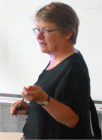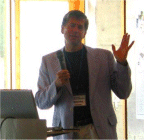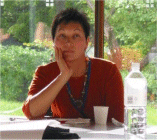 |
Return to the Top of Workshop
The 3rd CEFOM/21 International
Symposium
Trust in Groups from Cross-Societal Perspectives
Date: September 26 (Fri) - 28 (Sun), 2003
At: En'yu Gakusha at Hokkaido University
Speakers:
Marilynn
Brewer (Department of Psychology, Ohio State University, USA)
Nancy
Buchan (School of Business, University of Wisconsin-Madison, USA)
Margaret
Foddy (Department of Psychology, Carleton University,
Canada)
Robert Kurzban (Department of Psychology, University of Pennsylvania,
USA)
Michael Macy (Department of Sociology, Cornell University, USA)
Tom
Tyler (Department of Psychology, New York University, USA)
Mark
van Vugt (School of Psychology, University of Southampton, England)
Toshio
Yamagishi
(Department of Behavioral Science, Hokkaido University, Japan)
Masaki Yuki (Department
of Behavioral Science, Hokkaido University, Japan)
The goal of the symposium was to facilitate intellectual
exchanges and future collaboration among researchers who sought to understand
how trust emerges and functions within and across groups.
Specifically, participants discussed psychological mechanisms that
were related to ingroup-favoring and/or outgroup-discriminating behavioral
patterns and their adaptive foundations. Each participant discussed
how his or her work shed light on this issue. Here are some questions
addressed:
# What are the links between social cognitive processes and
ingroup behavior?
# Can we expect the same sorts of cultural differences in
group-based behavior as are claimed for cognitive processes (e.g. Nisbett
et al.) and the self concept (e.g. Markus and Kitayama)?
# Is it feasible to propose a "naive theory of groups" that
guides the behavior of people in relation to ingroups and outgroups?
How should we understand the basis of such a naive theory (Evolutionary?
Social structural?)
# What methodological strategies should be employed in addressing
the above questions?
Day 1: Friday, September 26th, 2003
9:30 - 10:45
Session 1: Toshio Yamagishi
"An Institutional
Approach to Groups"

11:00 - 12:15
Session 2: Marilynn Brewer
"Ingroup Cooperation
and Trust: Two Models"
 
13:45 - 15:00
Session 3: Tom Tyler
"Identification and Cooperation in Groups"
 
15:15 - 17:00
Poster Session
 
[Poster Presentations]
Kosuke
TAKEMURA & Masaki YUKI
"Are Intergroup Relations Competitive in Japan?: A Test of Discontinuity
Effect
in a 'Collectivist' Society"
Daisuke NAKAMA, Shinobu KITAYAMA, & Beth MORLING
"Culture and Friendship: Social Construction of the Self in Japan and the
US"
Naoto SUZUKI & Toshio YAMAGISHI
"The Function of General Trust and Caution"
Rie MASHIMA & Nobuyuki TAKAHASHI
"The Emergence of Indirect Reciprocity"
Mizuho SHINADA, Yu OHMURA & Toshio YAMAGISHI
"Why Do Third Party Punish? Altruistic Punishment and Social Exchange in
Groups"
Kunihiro YOKOTA & Masaki YUKI
"The Effect of Intergroup Competition Priming on the Pattern of Ingroup
Favoritism in the Minimal Group Paradigm"
Chisato TAKAHASHI, Shigehito TANIDA, & Toshio YAMAGISHI
"Is Beauty Skin Deep? : How Physical Attractiveness Affects Behavior in
Social Exchange"
Mayumi MIYAHARA & Toshio YAMAGISHI
"Social Construction of Groups: A Preliminary Study of Imposed Social
Identity"
Toko KIYONARI, Margaret FODDY, & Toshio YAMAGISHI
"Group-based Trust in the Minimal Group Situation: Comparison of Indirect
and
Direct Exchange Relations in Japan and Australia"
18:00 - 20:00
Reception
Day 2: Saturday, September
27th, 2003
9:30 - 10:45
Session 4: Margaret Foddy
"Rethinking Reputation: Group
Membership and Trustworthiness"
 
11:00 - 12:15
Session 5: Robert Kurzban
"Evolution, Trust, and
Reciprocity"
 
13:15 - 14:30
Session 6: Mark van Vugt
"Kinship Cues as a Basis
for Cooperation in Groups: The Familiarity Hypothesis"
 
14:45 - 16:00
Session 7: Michael Macy
"Group Polarization and Dynamic Networks: A Hopfield Model of Emergent Structure"
 
Day 3: Sunday, September 28th, 2003
9:15 - 10:30
Session 8: Nancy Buchan
"An International Investigation
of the Influence of Social Distance on Trust"
 
10:45 - 12:00
Session 9: Masaki Yuki
"Category-based Collectivism
versus Network-based Collectivism: Identifying Two Types of Individual-Group
Relations in the West and the East"

Return to the Top of Workshop
Return to Top
|
 |





